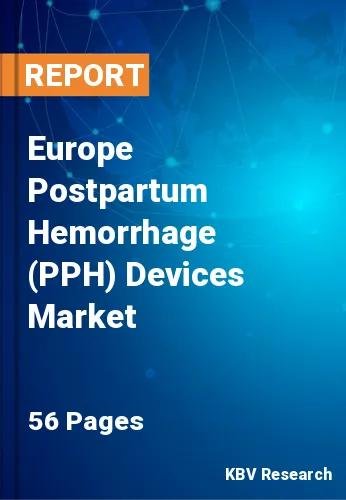
The Europe Postpartum Hemorrhage (PPH) Devices Market would witness market growth of 5.0% CAGR during the forecast period (2022-2028).
After giving birth, a woman may experience postpartum hemorrhage. It's a dangerous yet uncommon disorder. It normally occurs within one day of giving birth, however, it can occur up to 12 weeks later. Postpartum hemorrhage affects 1 to 5 out of every 100 (1 to 5%) women who give birth. After giving delivery, it's usual to lose some blood. During vaginal birth, women lose about half a quart (500 milliliters), and following a cesarean birth (also called c-section), they lose about a quart (1,000 milliliters). A c-section is a procedure in which the baby is delivered through a cut in the tummy and uterus made by an obstetrician. Postpartum hemorrhage causes the mother to lose a lot more blood, which is why it's such a dangerous condition. Postpartum hemorrhage can result in a significant reduction in blood pressure. This can result in shock and death if not addressed promptly. Shock occurs when blood supply to the body organs is insufficient.
The most common cause of PPH when the uterus' muscles do not contract (tighten) properly after birth. After a baby is born, uterine contractions help to stop bleeding from the site where the placenta separates from the uterus. If the uterus is stretched or enlarged (sometimes termed distended) after giving birth to twins or a large kid, the mother may have uterine atony (more than 8 pounds, 13 ounces). It can also happen if one has had numerous children, are in labor for an extended period of time, or have too much amniotic fluid. The fluid that surrounds the baby in the womb is called amniotic fluid.
In Europe, postpartum hemorrhage (PPH) is still a leading cause of maternal mortality and morbidity. It is the third largest cause of maternal death in the United Kingdom, as well as the most common reason for obstetric-related critical care hospitalizations.
In the United Kingdom, the prevalence of primary PPH has steadily increased, reaching 13.8 percent in 2012–2013. Because of its complicated origin, early detection and treatment remain critical to lowering the incidence of PPH. According to the current Confidential Enquiries into Maternal Deaths and Morbidity in the United Kingdom, there are significant differences in how obstetric bleeding situations are managed, which leads to greater morbidity. National guidelines have been produced to standardize care and give doctors and healthcare professionals a clear evidence-based framework to address this significant health concern. Despite this, the implementation of these standards in clinical practice is still lacking. The high rate of postpartum hemorrhage in the region is likely to lead to high demand for postpartum hemorrhage devices.
The Germany market dominated the Europe Postpartum Hemorrhage (PPH) Devices Market by Country in 2021, and would continue to be a dominant market till 2028; thereby, achieving a market value of $68.9 Million by 2028. The UK market is experiencing a CAGR of 4.1% during (2022 - 2028). Additionally, The France market would exhibit a CAGR of 5.7% during (2022 - 2028).
Based on Product, the market is segmented into Uterine Tamponade Devices, Prefilled Injection System, and Non-Pneumatic Anti-Shock Garment. Based on countries, the market is segmented into Germany, UK, France, Russia, Spain, Italy, and Rest of Europe.
Free Valuable Insights: The Global Postpartum Hemorrhage (PPH) Devices Market Size will Hit $1.05 Billion by 2028, at a CAGR of 5.2%
The market research report covers the analysis of key stake holders of the market. Key companies profiled in the report include Teleflex, Inc., Becton, Dickinson and Company, Bactiguard Holding AB, Utah Medical Products, Inc., Organon & Co., Cook Medical, Inc., PATH, Obstetrx, Inc., Zoex Corporation, and 3rd Stone Design, Inc.
By Product
By Country
Our team of dedicated experts can provide you with attractive expansion opportunities for your business.
